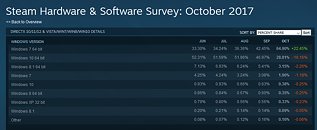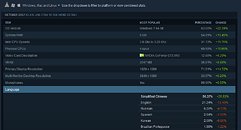Monday, November 6th 2017

Driven by Chinese PUBG Players, Windows 7 Now Most Popular OS on Steam
Steam's October survey has brought with it some interesting tidbits and reversals regarding the state of the world's OS shares. The latest such survey from the company shows Windows 10 lose its crown as the most popular OS for gamers, shadowed by a resurgence of Windows 7. Microsoft may be looking for increased Windows 10 market share throughout the world, but there's one country that has been the most troubling for the company's efforts: China. Remember that Microsoft had to introduce its own China Government edition of Windows 10 to the Chinese government, or otherwise risk the country not to transition to its new OS. However, it seems that that fact has led Chinese people's trust in the Microsoft OS to decrease even more; and absent of access to the China Government edition for regular customers, they're simply choosing to stay within the confines of Windows 7.
All of this seems pretty academic, so let's get some numbers here: Windows 10 shed 17.38% points in October, down to a 28.6 percent share, with the 64-bit version accounting for 28.23% of that share. At the same time, Windows 7 has gained 21.47% points in the same month, climbing to 65.46% of share (63.60 percent for the 64-bit build, and 1.86 percent for the 32-bit edition). Where's the connection to Chinese users here though? Well, take a look at the Steam OS language stats for the same month: simplified Chinese rose by 26.83% up to 56.37%, against a decrease in practically all other languages, and a very considerable 13.4% drop in English.But where's PUBG in all of this, though? Well, that slight piece of the puzzle you can glean from Steam Spy's analysis of PUBG's player base, which shows an adequate (roughly) 600% percent increase in player count from around 1 million players in August to around 6 million as of October. Around 3.1 million of those entered the scene starting in September. PUBG is simply a phenomenon in China, and Chinese users really seem to be trying to make the most of it while they still can: reports peg the game as being in line for a ban from the Chinese government, as a Chinese Gaming Association has deemed PUBG to go "against Chinese values and ethical norms."
Sources:
Steam Hardware Survey, via TechSpot, Steam Spy, CGICG
All of this seems pretty academic, so let's get some numbers here: Windows 10 shed 17.38% points in October, down to a 28.6 percent share, with the 64-bit version accounting for 28.23% of that share. At the same time, Windows 7 has gained 21.47% points in the same month, climbing to 65.46% of share (63.60 percent for the 64-bit build, and 1.86 percent for the 32-bit edition). Where's the connection to Chinese users here though? Well, take a look at the Steam OS language stats for the same month: simplified Chinese rose by 26.83% up to 56.37%, against a decrease in practically all other languages, and a very considerable 13.4% drop in English.But where's PUBG in all of this, though? Well, that slight piece of the puzzle you can glean from Steam Spy's analysis of PUBG's player base, which shows an adequate (roughly) 600% percent increase in player count from around 1 million players in August to around 6 million as of October. Around 3.1 million of those entered the scene starting in September. PUBG is simply a phenomenon in China, and Chinese users really seem to be trying to make the most of it while they still can: reports peg the game as being in line for a ban from the Chinese government, as a Chinese Gaming Association has deemed PUBG to go "against Chinese values and ethical norms."




86 Comments on Driven by Chinese PUBG Players, Windows 7 Now Most Popular OS on Steam
I still have my privacy, security, and functionality in w10. Its the paranoid androids doing without. :)
I really don't understand people who judge others negatively, because they didn't do the same choices they did.
I am running both Windows 7 and 10 and I really don't feel the need to have all my systems to a continued beta testing mode, because Microsoft needs so, while it transforms it's operating system from a standard version to an ongoing changing service.
Business licenses expire in 2020, and when they do, anything using them becomes unusable until they get a new license. For many businesses, they either move to 10 or have no machines.
7 wont stick around like XP did, thats for sure.There are two main reasons most cite for running windows 10: "ZOMG SPYWORE!!!!11!!" and "The tablet interface doesnt belong on a PC".
The first one is also true of any windows 7 machine updates in the past 2 years, and more importantly, there is no evidence that this spyware is anything but users freaking out over speculation. Telemetry has been collected since windows 2000 (and I'll bet money that nearly every single one of said users uses a smartphone with voice recognition and possibly facebook/twitter installed, the google search engine, accounts on many website, uses the web for banking ans shopping, ece.) The "tablet interface" complainers are either too lazy or incompetent to install classic shell if they want the 7 interface that badly.
there are legitimate reasons to stay on 7 (software compatibility for one, although 10 seems pretty good in this regard). The reasons most cite while spewing about how terrible 10 is and why they are staying on 7 are ridiculous, and thus get ridiculed for being ridiculous.
There is also a third reason, as you pointed out: "10 IS BETA SOFTWARE!!". If you dont want to use "beta" software, stay out of the fast ring. The slow ring 10 has not resembled beta software since a few months from launch (in case you dont remember, 10 had an actual beta) and you can defer updates for quite some time on windows 10 pro if you are super paranoid. The people who always claim that 10 is like beta software always seem to have mysterious problems that point to either hardware faults or user error.
People judge those who make different choices negatively when those others choose differently for ridiculous and ill-informed reasons, then stay the course.
You also do assumptions here. The only difference between your arguments and someone's staying at Windows 7, is that you call "ridiculous and ill-informed reasons" the other person's arguments, while you find completely logical yours. Guess what. The other person probably sees yours arguments as "ridiculous and ill-informed reasons" and his as completely logical.
I do agree with one of your arguments. Telemetry is everywhere and most of us already give our personal information to about everyone. "Hi, do you want to win an iPhone? You only have to fill this form with your personal information, so we can find you in case you win". Just an example.
Towards the end of MS supporting XP-
It was bloated by updates (a clean install took a day to update on my old core duo)
It was full of security vulnerabilities which MS struggled to keep up with
W7 offered better stability, speed and smaller footprint with no downsides
7 still works fine. XP (despite being a good OS in its day) was dead in the water by the time MS gave up on it.
10 has DX12. That's about all it has to offer above 7 ATM.
Chinese are like "if it ain't bust don't fix it".
I run W10 at work and see nothing that I am missing out on over W7 at home. If anything, W10 has introduced more issues than added benefit for our environment. For gaming: all of my games look great and the performance is fine so no gripes there.
For very old systems that usually top at 2-4GB of maximum supported memory, XP is fine if the person using it is not stupid to install everything unknown sites, mails, whatever ask him to install. Even then, security is just a question mark, but not as much a sure disaster as many insist. I keep a really old laptop that gets freak out with more than 2GB or memory, making Win 7 a pain to use(opening a browser eats those 2GBs in no time, turning to disk for more). But XP runs beautifully and after a year or so of usage, a virus+malware scan on the disk, performed from another OS, shown nothing.
Win 7 can take advantage of almost any hardware is available today. When most new hardware stops working on 7, people will be forced to upgrade.
And XP is fundementally less secure than modern OS's, because duh. Run a Linix distro from 2007 and you have the same problem. All them zero days turning up everywhere? Assume they are worse on XP.